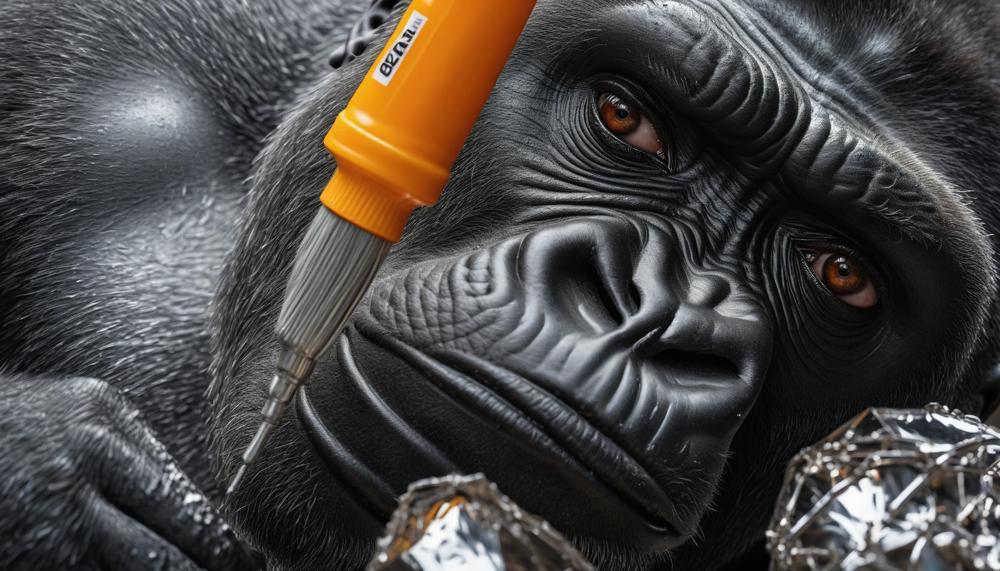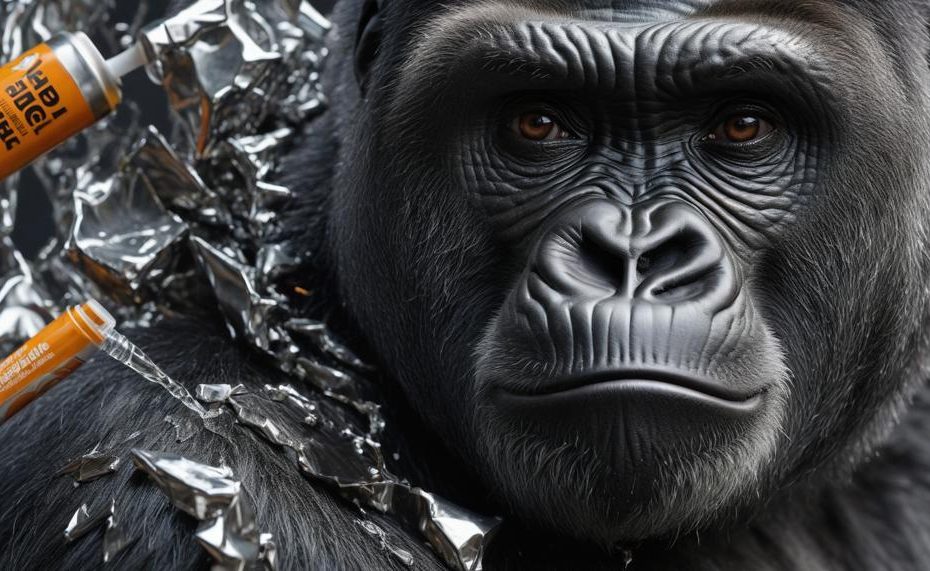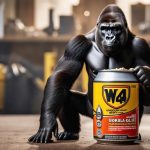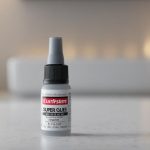Yes, Gorilla Glue can be effectively used to bond metal surfaces, but the success depends on following the right application methods and being mindful of certain limitations. Here are the key points to remember:
- Gorilla Glue forms an incredibly strong and durable bond on ferrous metals like steel, delivering excellent results.
- For non-ferrous metals like aluminum, the adhesive may cause corrosion over time, so it’s not recommended.
- Proper surface preparation and clamping are crucial for achieving a lasting bond on metal.
- Gorilla Glue with the accelerator additive performs best across different metal types.
- Consider using the specialized GorillaWeld product for high-strength metal bonding in just 10 minutes.
- Always conduct a test patch first to ensure compatibility with your specific metal surface.
With its versatility and strength, Gorilla Glue can be a reliable option for bonding metal, as long as you follow the manufacturer’s guidelines and take the necessary precautions. Eager to learn more about using this multipurpose adhesive on various materials? Keep reading.

Table of Contents
Does Gorilla Glue Work on Metal
Yes, Gorilla Glue can effectively bond metal materials together, but the strength of the bond may vary depending on the type of metal being glued.
Gorilla Glue works best on ferrous metals like steel, forming a strong and durable bond that can withstand extreme temperatures, solvents, and moisture.
For non-ferrous metals like aluminum, the bonding may be more difficult, and there is a risk of corrosion. It is recommended to do a test patch first to ensure compatibility.
When using Gorilla Glue on metal, it is crucial to clean and prepare the surfaces properly and clamp the pieces together until the glue has fully cured.
Gorilla Glue with accelerator has been found to perform best on various metals, including aluminum, steel, and copper.
For even stronger metal bonding, consider using GorillaWeld, a specialized adhesive that works in just 10 minutes and has a high bond strength on metal surfaces.
The table provides a concise yet comprehensive answer to the question, highlighting the effectiveness of Gorilla Glue for bonding metal materials, particularly ferrous metals like steel, while also addressing potential challenges with non-ferrous metals like aluminum. It emphasizes the importance of proper surface preparation and clamping, and offers additional recommendations, such as using Gorilla Glue with accelerator or GorillaWeld for stronger metal bonding.
Polyurethane-Based Glues (Like Gorilla Glue)
Polyurethane-based glues like Gorilla Glue possess unique properties that render them well-suited for bonding metal surfaces. Their exceptional adhesion stems from the ability to expand as they cure, allowing the glue to penetrate microscopic pores and irregularities on the metal surface. This expansion creates an incredibly robust mechanical bond that is virtually impervious to shearing forces.
Moreover, polyurethane adhesives exhibit remarkable water and temperature resistance, ensuring the longevity of the bond even in harsh outdoor environments. Their versatility extends beyond metals, making them ideal for a wide range of materials, including wood, stone, and ceramics.
Notably, proper surface preparation is crucial for achieving optimal adhesion. Degreasing and roughening the metal surface enhances the bond strength by increasing the surface area for the glue to grip. Additionally, clamping during the curing process minimizes gaps and facilitates a seamless bond. Gorilla Glue‘s unique formulation allows for gap-filling capabilities, making it an excellent choice for uneven or porous metal surfaces.
While polyurethane glues excel at bonding metals, their performance can vary depending on the specific metal type. For instance, Gorilla Glue may encounter challenges when bonding non-ferrous metals like aluminum. In such cases, using an accelerator or a specialized product like GorillaWeld can significantly enhance the bond strength.
Polyurethane adhesives require moisture to initiate the curing process, which can pose challenges in certain environments. However, this characteristic also contributes to their exceptional bonding capabilities, as the moisture aids in the expansion and penetration of the glue into the substrate’s pores.
Cyanoacrylate-Based Adhesives (Like Gorilla Super Glue)
Cyanoacrylate-based adhesives, like Gorilla Super Glue, possess several remarkable properties that make them well-suited for bonding metal surfaces:
Rapid Curing
Cyanoacrylates cure almost instantly when exposed to moisture, allowing for quick bonding and minimizing the need for clamping or fixturing.
High Bond Strength
These adhesives form exceptionally strong bonds with metals, often surpassing the strength of the substrates themselves.
Gap-Filling Ability
Their low viscosity allows cyanoacrylates to wick into small gaps and crevices, ensuring a tight bond even on irregular surfaces.
Versatility
Cyanoacrylates can bond a wide range of metals, including steel, aluminum, copper, and brass, making them highly versatile.
Temperature Resistance
Once cured, these adhesives maintain their bond strength over a broad temperature range, from frigid to moderately elevated temperatures.
While cyanoacrylate adhesives excel at bonding metals, it’s crucial to ensure proper surface preparation by removing any contaminants or oxidation. Additionally, their lack of flexibility can make them unsuitable for applications involving significant thermal expansion or vibration.
Epoxies
Yes, epoxies can serve as a viable alternative to Gorilla Glue for bonding metal surfaces. While Gorilla Glue’s cyanoacrylate adhesives offer rapid curing and versatility, epoxy adhesives possess several advantageous qualities that make them well-suited for metal bonding applications.
Epoxies exhibit exceptional adhesion strength and durability, often rivaling the bond strength of welding. Products like the J-B Weld 8271 Reinforced Epoxy are specifically formulated for bonding metal, providing a reinforced, high-strength bond that can withstand extreme temperatures, vibrations, and impact.
Unlike cyanoacrylates, which can become brittle over time, epoxies maintain their flexibility and resilience, making them less prone to cracking or breaking under stress. This characteristic is particularly beneficial for metal bonding applications where the joined components may be subjected to flexing or movement.
While Gorilla Glue offers a relatively fast cure time, epoxies like the Gorilla 2-Part Epoxy provide a longer working time, allowing for precise alignment and positioning of the metal pieces before the adhesive sets. This can be advantageous when working with larger or more complex metal assemblies.
Epoxies are also highly versatile, capable of bonding a wide range of metals, including steel, aluminum, brass, and cast iron. They can even bond dissimilar metals, making them a practical choice for various metalworking projects and repairs.
While cyanoacrylate adhesives may have limitations in gap-filling ability, epoxies can effectively fill gaps and irregularities between metal surfaces, creating a seamless and robust bond. This feature is particularly useful when working with rough or uneven metal surfaces.
Contact Adhesive (Fast-Drying)
The fast-drying feature of contact adhesive can have both advantages and disadvantages when used on metal surfaces. Here’s a breakdown of how it affects its effectiveness:
| Advantages | Disadvantages |
|---|---|
|
|
| The fast-drying feature can be advantageous for time-sensitive projects and preventing accidental movement, but it also poses challenges in terms of precise alignment, excess glue removal, and surface preparation. Careful handling and proper preparation are essential for ensuring the effectiveness of contact adhesive on metal surfaces. | |
In essence, the fast-drying nature of contact adhesive is a double-edged sword when working with metal surfaces. While it offers speed and efficiency, it also demands meticulous preparation and handling to overcome the limited working time and potential issues with alignment, residue, and surface cleanliness. Striking the right balance is crucial for achieving a strong and visually appealing bond.
Waterproof Contact Adhesive
Yes, waterproof contact adhesive is suitable for use on metal surfaces. These specialized adhesives are designed to create a durable, moisture-resistant bond on various metal substrates, including steel, aluminum, and galvanized materials. Here’s a breakdown of the key properties and advantages of using waterproof contact adhesives on metal:
Waterproof and Weatherproof
These adhesives form a water-resistant seal that prevents moisture penetration, making them ideal for outdoor applications or areas with high humidity.
They provide long-lasting protection against corrosion, rust, and degradation caused by exposure to water or harsh environmental conditions.
Strong Adhesion
Waterproof contact adhesives are formulated to create a tenacious bond with metal surfaces, ensuring a secure and reliable connection.
This strong adhesion helps prevent delamination, peeling, or separation, even under stress or vibration.
Versatility
These adhesives can be used on various metal types, including steel, aluminum, galvanized steel, and even dissimilar metal combinations.
They are also compatible with other materials like plastics, rubber, and composites, making them suitable for multi-material assemblies.
Additionally, many waterproof contact adhesives are based on silane-modified polymers (SMP) or other advanced formulations that provide excellent flexibility, allowing the bond to withstand thermal expansion and contraction without cracking or losing adhesion. This makes them suitable for applications where metal components may experience temperature fluctuations or vibrations.
When using waterproof contact adhesives on metal surfaces, it is crucial to follow the manufacturer’s instructions for surface preparation, application techniques, and curing times to ensure optimal performance and longevity of the bond. Proper cleaning and degreasing of the metal surfaces is essential for achieving maximum adhesion strength.
Conclusion
Gorilla Glue proves a versatile and robust option for bonding metal surfaces, though its effectiveness varies across different metal types. Its polyurethane formula allows it to expand into microscopic pores, creating an incredibly strong mechanical bond that resists shearing forces. Gorilla Glue excels at bonding ferrous metals like steel, delivering exceptional adhesion that withstands extreme conditions. For non-ferrous metals such as aluminum, proper preparation and using an accelerant additive is crucial to prevent corrosion over time.
The specialized GorillaWeld product offers rapid 10-minute curing for high-strength metal bonding across various substrates. Cyanoacrylate adhesives like Gorilla Super Glue also provide rapid curing and impressive bond strength on metals, though surface preparation is vital. Epoxy adhesives present another compelling metal bonding solution, offering superior gap-filling abilities, flexibility, and extreme temperature/chemical resistance.
While fast-drying contact adhesives enable efficient bonding, they demand meticulous preparation to overcome limited working times.






